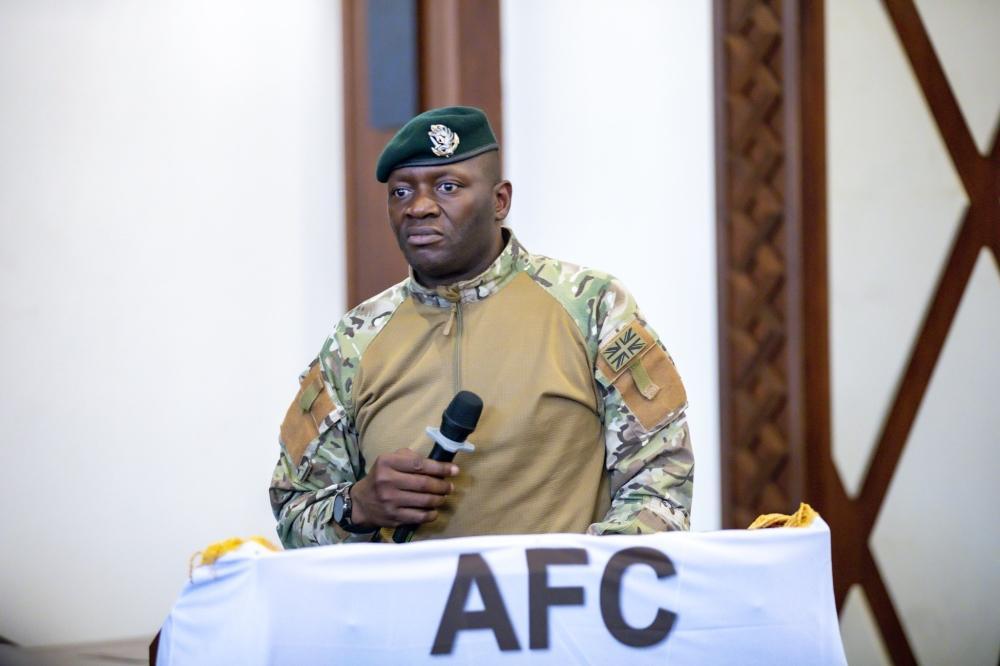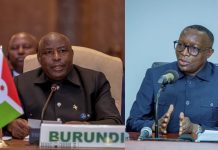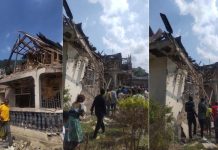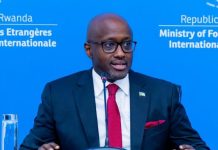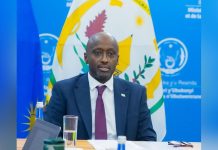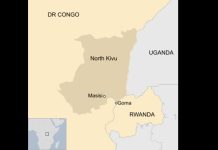Africa-Press – Rwanda. Contrary to what was earlier announced, the Congolese army (FARDC) and its coalition forces have not withdrawn their attack drones from the town of Walikale, a situation that is delaying the repositioning of the Alliance fleuve Congo (AFC/M23) rebellion’s forces in the area.
Rebel spokesperson Lawrence Kanyuka brought this “to the attention of the national and international community,” in a post on X, early Monday, March 24, adding that: “It should be emphasized that this act constitutes a major obstacle to compliance with the ceasefire and thus compromises ongoing peace initiatives.” Kanyuka’s statement came hours before the Heads of State and Government of the East African Community (EAC) and the Southern African Development Community (SADC) were scheduled to convene for their second joint meeting to address the security situation in eastern DR Congo.
In line with a unilateral ceasefire declared on February 22, and to support peace initiatives aimed at fostering conditions conducive to political dialogue and addressing the root causes of the conflict in eastern DR Congo, the rebel movement on March 22 announced that it “decided to reposition its forces from the town Walikale” in North Kivu Province, which it seized on March 19.
The town of Walikale which sits about 130 kilometres northwest Goma, the capital of North Kivu Province which the rebels seized on January 27. It was the farthest west the rebels had reached during their rapid advance this year. Walikale has, for many year, been a stronghold of FDLR, a DR Congo-based terrorist militia founded in mid-2000 by remnants of the masterminds of the 1994 Genocide against the Tutsi in Rwanda.
The Congolese government which has integrated the group’s fighters into its national army ranks – especially in the elite presidential guard brigade – continues to deliberately minimise the existential threat posed by the genocidal militia whose lethal genocidal ideology has wreaked havoc in the country, and the great lakes region.
On Saturday, the rebels warned that any provocation or renewed attacks by the Congolese army coalition – comprising hundreds of European mercenaries, the Rwandan genocidal militia, a group of Congolese militias known as Wazalendo, thousands of Burundian troops, South African-led SADC forces, as well as UN peacekeepers – against the civilian population, including in rebel liberated areas “and our positions, will lead to an automatic reversal of this decision.”
Walikale was a vital commercial hub for the Rwandan genocidal militia.
The genocidal militia’s president Gaston Iyamuremye, alias Byiringiro Victor Rumuli, now 77, had his main headquarters in the region where many genocide fugitives are believed to have thrived. The rebel advance in the region means some could have been captured while others were forced to bolt, heading in various directions farther inland.
The largest territory in the province, Walikale territory is bordered by Lubero territory on the north, Rutshuru territory and Masisi territory on the east, Tshopo Province and Maniema Province on the west, and South Kivu Province on the south.
According to reports, areas controlled by the genocidal militia were mainly isolated forests and mining sites, exploited illegally and manually, with the militia’s own governance system.
The latest fighting between the Congolese army coalition and M23 rebels started in 2021.
The M23 was created on May 6, 2012, due to numerous failures of the Congolese government, including Kinshasa’s refusal to implement a peace agreement signed on March 23, 2009. In January 2009, a former politico-military group formed about three years earlier, the Congrès national pour la défense du people (CNDP), had stopped rebellion after Kinshasa promised to, among other things, integrate its fighters into the national army.
Top government officials including the then defense minister Charles Mwando Simba – who passed away, in Belgium, in December 2016 – attended a ceremony held at Rumangabo military camp, about 45 kilometres north of Goma, the capital of North Kivu Province, to welcome the first 50 rebel soldiers into the national army.
“I note the act of integration of CNDP forces as well as Pareco into the armed forces and I congratulate you,” the visibly pleased Mwando said during the ceremony.
Julien Paluku, the then Governor of North Kivu Province [January 2007 to February 2019] – now minister of external trade – said it was “a big day for the Province of North Kivu” and thanked all involved for the effort that was meant to bring peace to the region.
“No one benefits from war,” Paluku said, adding, “all we benefit from is peace.”
A few days later, CNDP officials announced the “the de facto transformation of CNDP into a political party” recognized by the government –after their fighter’s integration into the national army.
But by year end, about 11 months after denouncing rebellion and becoming a political party, everything was back to ground zero.
At the time, a frustrated head of the ex- rebel group-turned political party, Désiré Kamanzi, resigned.
“The fundamental reasons are, notably, the slowness in implementation of the agreements we have signed with the government since January,” Kamanzi announced, explaining that “we requested that there be holding of a regular national monitoring committee, but this was in vain.”
According to Kamanzi, only three sessions had been held – one in Kinshasa and two in Goma – and only at the request of international facilitators.
“Personally, I realized that it was becoming a very big frustration on my part.”
M23 is now part of a larger and continuously growing rebel coalition, Alliance fleuve Congo (AFC), created in December 2023.
On March 17, up to 100 youths from Bweremana, in the Bahunde chiefdom of Masisi territory, “expressed their desire to join” the rebel movement following an awareness-raising campaign conducted by North Kivu Province’s new leaders.
A vast Congolese army coalition backed by Western countries including Belgium and comprising the Rwandan genocidal militia and Burundian forces worsened the security situation while battling the AFC/M23 rebels.
Led by Corneille Nangaa, the former chairman of the Congolese national electoral commission, Alliance fleuve Congo is fighting for governance that supports basic human rights, secures all Congolese citizens, and addresses the root causes of conflict. The rebellion has vowed to uproot tribalism, nepotism, corruption, and the genocide ideology spread by FDLR, among other vices, widespread in DR Congo.
On Sunday, noted that 16 years have passed since the signing of the peace agreement between CNDP and Kinshasa on March 23, 2009, “without the root causes of the conflict being truly addressed.”
The failure to implement this agreement led to the creation of the M23 on May 6, 2012, he stressed, adding that “successive governments have often favoured superficial solutions, treating the symptoms without tackling the roots of the problem, thus perpetuating an endless cycle of violence in our country.”
Kanyuka added: “These root causes unfortunately persist to this day, and the sanctions, condemnations and resolutions taken against our organization only fuel tensions and compromise peace efforts.”
The AFC/M23 is committed to protecting and defending all Congolese people, he said.
“We call on national and international human rights organizations to pay particular attention to the continued spread of hate speech and incitement to violence by certain members of Mr. Félix Tshisekedi Tshilombo’s cabinet and his Union Sacrée.”
“Only by addressing the root causes of conflict can we hope to end the cycles of war that plague our nation.”
In January, the rebels quickly advanced across North and South Kivu provinces, liberating swathes of territory.
Following heavy fighting triggered by constant violations by the Congolese army coalition, of an earlier set ceasefire, on January 27, the rebels captured Goma, and restored order there.
As the security situation in South Kivu deteriorated amid reports of violence, looting, and abuses propagated by the Congolese army coalition, the rebels again reacted, first capturing the strategic airport of Kavumu, before moving south to capture the regional capital, Bukavu, on February 15.
Last week, on Monday, the rebels withdrew from earlier scheduled direct peace talks with the Congolese government, in the Angolan capital, Luanda, on March 18, citing interference by Western countries – especially from the EU, led by Belgium – and certain international institutions who they accused of “deliberately working to sabotage peace efforts” in DR Congo and make the long-awaited talks impossible.
Kanyuka said: “The successive sanctions imposed on our members, including those adopted on the eve of the Luanda discussions, seriously compromise direct dialogue and prevent any progress.”
AFC Executive Secretary Benjamin Mbonimpa said: “The EU has just sabotaged the Luanda dialogue which was to begin this Tuesday, March 18, 2025, and bring our organization and the power of Kinshasa around the table! This is where the malicious interference of certain countries nostalgic for colonization leads!”
Villages inhabited by unarmed Banyamulenge civilians are still waking up to attacks, especially bomb explosions, by the Congolese army and its Wazalendo allied militia in South Kivu Province, according to Moise Nyarugabo, a Congolese lawyer.
For More News And Analysis About Rwanda Follow Africa-Press

